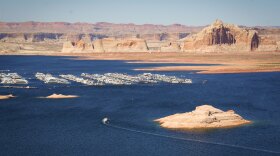-
Utah’s statewide snowpack level has reached a record low. Much of the West is in the grip of a snow drought, impacting everything from water supplies to mountain forests.
-
Four days of negotiations in a Salt Lake City conference room earlier in January did not appear to have sparked a breakthrough.
-
The proposals range from taking "no action" to a scenario that might result in water cuts to the lower basin states of California, Nevada and Arizona. One alternative developed in partnership with conservation groups would incentivize proactive conservation of the river.
-
“We're closer to the edge of the cliff than we realize,” said one Colorado River expert who worked on a new report outlining what 2026 could hold for Utah’s Lake Powell.
-
Because of drought, mandatory water cuts are nothing new in Utah. But the potential of large-scale reductions across the Colorado River Basin would present a steep challenge.
-
Drought and steady demand along the Colorado River are draining the nation's second-largest reservoir. Land that was once submerged is now full of beavers and thriving ecosystems.
-
La cantidad de visitantes ha disminuido en todos los parques de Utah, impulsada por una baja en el turismo internacional. La incertidumbre económica y la retórica política podrían estar alejándolos, con grandes implicaciones para las economías locales que dependen de ellos.
-
Visitation is down at all of Utah’s parks, driven by a decline in international visitors. Economic uncertainty and political rhetoric may be keeping them away, with big implications for local economies that depend on them.
-
Colorado River states appear to be coalescing around the early makings of a new plan to share water in a way that accounts for climate change.
-
The mountains that feed the Colorado River with snowmelt are strikingly dry. Many ranges are less than 50% of their average snow for this time of year.
-
The Lower Basin states are asking for a fresh look at proposals for sharing the shrinking Colorado River water supply and changes to Lake Powell and the Glen Canyon Dam.
-
The water conservation pilot will use state money to compensate farmers who temporarily stop irrigating some of their land. It aims to launch by April, but some hurdles remain.
Play Live Radio
Next Up:
0:00
0:00
Available On Air Stations










